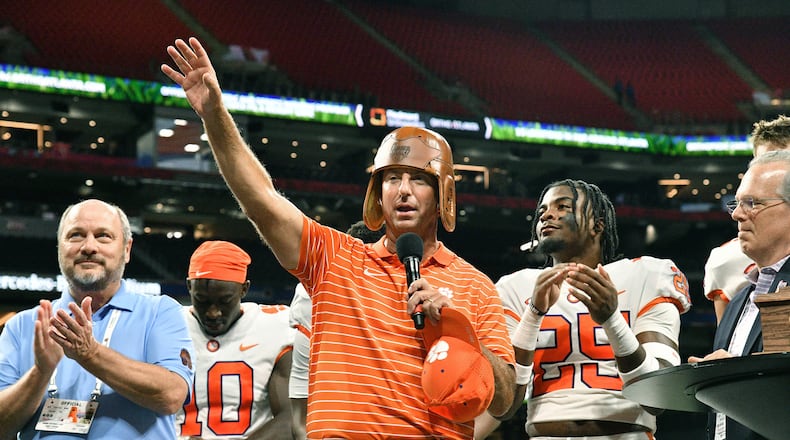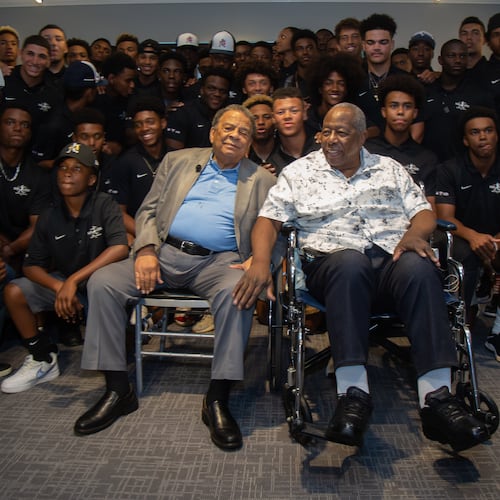For all the billions of dollars that pile up in corporate America, the task for sporting events to land corporate sponsorships remains a delicate and often difficult exercise.
In the sea of events, teams, schools and leagues that corporations can sponsor, the event first has to actually appeal to the company. The event has to be able to serve the company’s needs, whether it’s delivering an audience or providing a venue for corporate hospitality. The corporation has to have the marketing money available for a sponsorship and likewise, the event has to be in need of a sponsor. Ideally, there’s a logical connection between the two sides and a personal connection among dealmakers. For televised events, the company typically has to be willing to purchase commercial time.
“It’s unicorn hunting,” Atlanta-based sports marketing executive Vince Thompson told The Atlanta Journal-Constitution.
Or, in the case of Peach Bowl CEO and president Gary Stokan, you happen to run into the right executive at the New York Stock Exchange, which is how title sponsorship of his kickoff game seamlessly changed hands from one Chick-fil-A to Aflac, one Georgia corporate giant to another.
“It’s one of the greatest stories of my 45 years (in the business),” Stokan told the AJC. “It was (essentially) just a cold call. We’re just standing there, and (me) saying, ‘Hey, I think you’d be great for this.’”
The game, a fixture in Atlanta’s sports ecosystem and college football’s premier kickoff event, will mark its 15th year Friday with a matchup between Georgia Tech and Louisville at Mercedes-Benz Stadium. Aflac, the Columbus-based supplemental health and life insurance provider, will benefit from its exposure in a game that last year drew 4.9 million viewers.
“College football can attract everyone,” Aflac U.S. president Virgil Miller told the AJC. “We believe in that audience.”
Atlanta-based Chick-fil-A had sponsored the game from its inception in 2008. But, Stokan said, the company informed him in 2022 that it sought to be released from its commitment to being title sponsor through 2025. The chicken-sandwich chain continues to support the Peach Bowl and the College Football Hall of Fame but wanted to pursue other marketing initiatives.
Thompson, the founder and CEO of sports-marketing company Melt, had initiated a relationship between Aflac and the Peach Bowl, Thompson said, but the company then went through a change in leadership, with Miller being named the new president of Aflac U.S. in August 2022.
Stokan and Miller’s paths intersected in New York on Sept. 1 when a delegation of officials (and mascots) from Georgia and Georgia Tech and other Georgia-based executives traveled to the stock exchange for an honorary closing of the market’s trading day. Both Stokan and Miller were part of the group.
After the two were introduced, Stokan made his pitch for Aflac to succeed Chick-fil-A. The company already was invested into college football, perhaps most visibly through commercials featuring Alabama coach Nick Saban and now-Colorado coach Deion Sanders. Further, Aflac is located in Georgia. A clincher was that the Peach Bowl and Aflac both have a close connection with Children’s Healthcare of Atlanta; the Peach Bowl has donated $22.5 million of its proceeds to CHOA. Since 1995, Aflac has been the primary sponsor for CHOA’s cancer and blood disorder center, contributing more than $168 million to research and treatment.
“So when Gary mentioned the opportunity to do this with college football, with our current presence with what we do, I was excited,” Miller said. “I immediately made the phone call back, talked to (chief marketing officer Garth Knutson) and said, ‘Garth, get ready. We need to make this happen.’”
The deal was done, Stokan said, in a few months’ time. The Chick-fil-A cow had passed the baton to the Aflac duck.
“It’s like Michael Jordan said, ‘You miss all the shots, you don’t take,’ right?” Stokan said. “So I took the shot. He could have said (unenthusiastically), ‘Yeah, it’s great. Well, we don’t have any interest.’ But he ran the ball, so we got the kickoff game done.”
It’s another step into college athletics for the Fortune 500 company to spread its name and brand. Beyond Saban and Sanders, Aflac also is a sponsor of ESPN’s “College GameDay,” presents in-game trivia questions on TV broadcasts and will be the title sponsor of the women’s basketball season opener this November in Paris.
“It’s a family audience, people of all ages,” Miller said. “It knows no boundaries when it comes to diversity.”
Aflac declined to provide financial specifics. Sponsorship of bowl games can be in the neighborhood of $1 million with commitments to buy commercial time during the game that are several multiples of that.
Aflac is eager to begin its association with the game, which often has drawn national attention with Top 25 matchups. On Friday, Miller will be part of a group visiting patients at CHOA (Yellow Jackets legend Calvin Johnson also is expected to take part) in the company of a robotic duck that can be instructed to mirror children’s feelings. During the game broadcast, Aflac will debut a new commercial featuring Sanders and Saban.
The Peach Bowl’s agreement with Aflac runs through the 2025 game. A faithful Georgia fan, Miller is particularly excited for next year’s Aflac Kickoff game between Clemson and the two-time defending national-champion Bulldogs.
Miller said the day after the Aflac sponsorship was announced in July, he got a congratulatory text from Gov. Brian Kemp, pleased that sponsorship of the game was staying in-state.
“He thought that was very important for the state of Georgia and also for the city of Atlanta,” Miller said.
Typically, sports sponsorships are fairly mercenary deals. Both sides get something (money, exposure) from the other. That’s certainly happening here. But in this case, at least, one of the city’s most important charitable institutions is also a beneficiary, and that’s a transaction worth commemorating.
About the Author
The Latest
Featured



